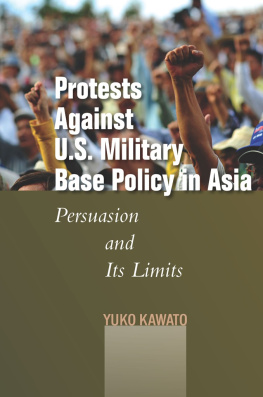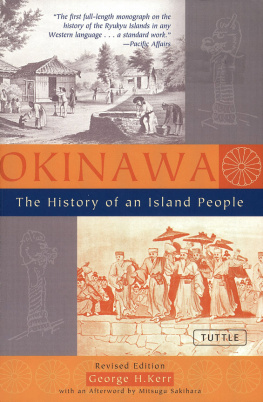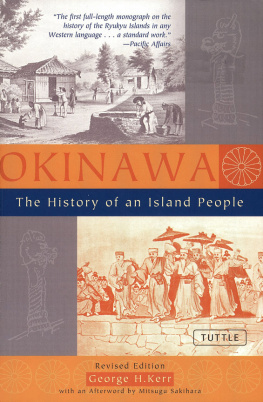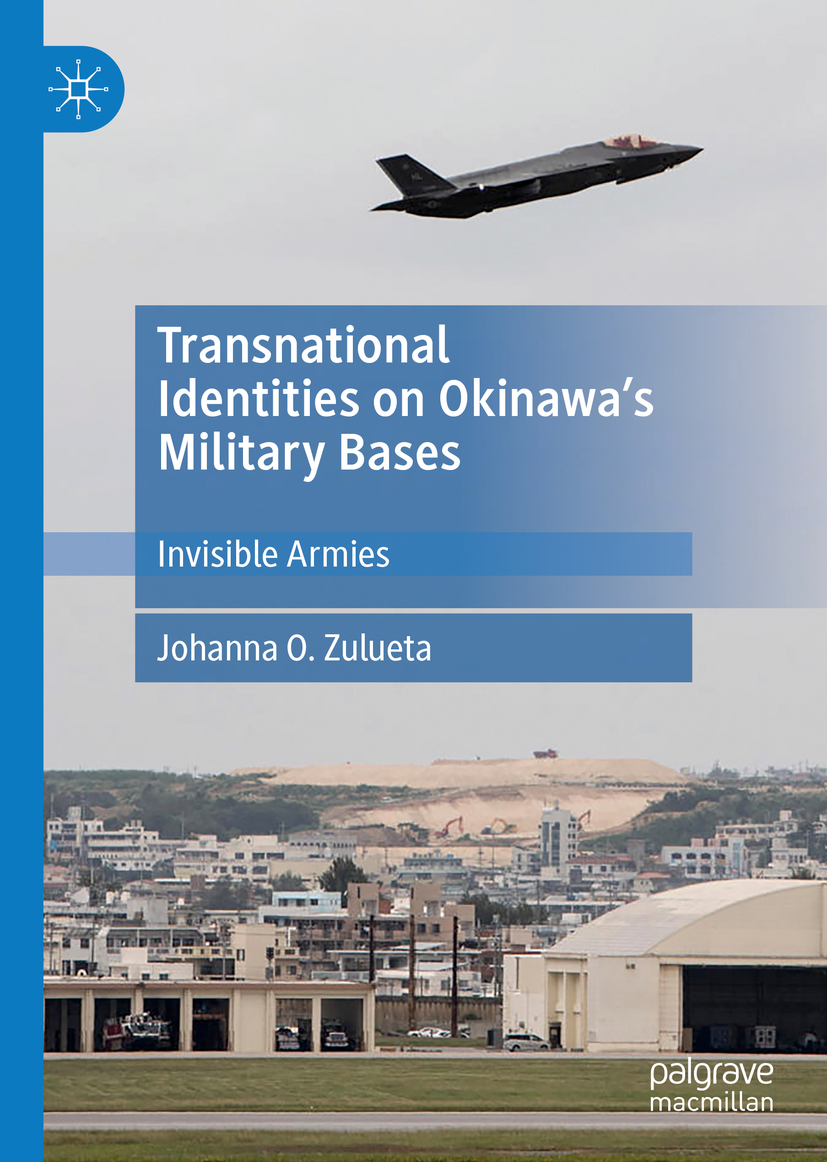Johanna O. Zulueta
Transnational Identities on Okinawas Military Bases
Invisible Armies
Johanna O. Zulueta
Soka University, Hachioji City, Tokyo, Japan
ISBN 978-981-32-9786-9 e-ISBN 978-981-32-9787-6
https://doi.org/10.1007/978-981-32-9787-6
The Editor(s) (if applicable) and The Author(s) 2020
This work is subject to copyright. All rights are solely and exclusively licensed by the Publisher, whether the whole or part of the material is concerned, specifically the rights of translation, reprinting, reuse of illustrations, recitation, broadcasting, reproduction on microfilms or in any other physical way, and transmission or information storage and retrieval, electronic adaptation, computer software, or by similar or dissimilar methodology now known or hereafter developed.
The use of general descriptive names, registered names, trademarks, service marks, etc. in this publication does not imply, even in the absence of a specific statement, that such names are exempt from the relevant protective laws and regulations and therefore free for general use.
The publisher, the authors and the editors are safe to assume that the advice and information in this book are believed to be true and accurate at the date of publication. Neither the publisher nor the authors or the editors give a warranty, express or implied, with respect to the material contained herein or for any errors or omissions that may have been made. The publisher remains neutral with regard to jurisdictional claims in published maps and institutional affiliations.
Cover illustration: Archistoric / Alamy Stock Photo
This Palgrave Macmillan imprint is published by the registered company Springer Nature Singapore Pte Ltd.
The registered company address is: 152 Beach Road, #21-01/04 Gateway East, Singapore 189721, Singapore
Although about a relatively small population, Zuluetas thoughtful and eye opening study of Filipino-Okinawan Nisei, in addition to introducing us to this largely unstudied group of migrants, sheds light on a huge range of larger issues having to do with the nature and dynamics of identity, nationality, citizenship, international and intercultural mobility, the status of Okinawa, Japans relationship with the US and its military, and the countrys changing relations with the Philippines in post-World War II and contemporary Japan, all while maintaining an ongoing dialogue with the extant general literature on migration and migrant identity. A fascinating read.
Lonny Carlile, Director, Center for Japanese Studies, University of Hawaii at Manoa, USA
Johanna Zulueta has conducted over a decade of deep research in the contact zone of Okinawa. Through the stories of individuals of mixed Okinawan and Filipino descent she illuminates the issues of identity and belonging that are integral to the experience of migration.
Vera Mackie, Senior Professor of Asian and International Studies, University of Wollongong, Australia
Johanna deciphers the entanglements in work and life between the US military, Okinawan communities, and the Filipino-Okinawan minority through an insightful close-up look at local life-courses.
Gabriele Vogt, Professor, Ludwig Maximilian University Munich, Germany
In loving memory of my father, Juanito Sison Zulueta.
You were always supportive and proud of my academic endeavours and was so looking forward to reading this book. Alas, you suddenly had to return to your Creator while I was finishing this book.
Thank you for everything, Papa.
Notes on Japanese Words and Names
Japanese words and names that have prolonged or extended vowel sounds are indicated by a macron (i.e. ). Translations of Japanese words are given in parenthesis whenever these words appear for the first time in the text. Japanese words are italicized throughout the texts, except for words that are used as concept (i.e. Nisei).
Japanese names that appear in the text are written following the Japanese way of writing, with the last name preceding the given (or first) name, except for sources written in English by Japanese authors, where I write the authors first name before his/her surname. Pseudonyms are used to identify my informants to protect their privacy.
Place names (e.g. Tokyo, Ryukyu) as well as some surnames (e.g. Ota, Oshiro) are written in their common Anglicized forms.
Acknowledgements
As a young graduate student in the early 2000s, I had been interested in issues of ethnic identityhow people define themselves and how their identities are also ascribed by society. As a person of Chinese descent, I have always grappled with my background; but as someone who has been detached from her Chinesenessone who is totally not familiar with her heritage and does not even speak a word of ChineseI saw myself in a seemingly liminal space, one whose physical features point to her Chinese ancestry, but one who is ignorant of her cultural heritage. While it may have been common sense to study more about my heritage, I took to the study of Japan to try to answer questions about ethnicity and identity. More so, my interest expanded beyond issues of ethnic identity, which led me to explore Japans peripheries and its marginal spaces, in particular, Okinawa.
My interest in Okinawa began accidentally in 2003, when I was introduced to the Philippine Okinawan Society (POS) by my adviser, Nagai Hiroko, of the Ateneo de Manila University. The POS is an organization founded in 1982 by Okinawan women who travelled to the Philippines as wives of Filipino men stationed in U.S. military bases in Okinawa. Incidentally, I chose to study their offspringhalf-Okinawan, half-Filipino individuals and analysed their identity constructions. They call themselves Nisei, to indicate their identity as second-generation Okinawans.
I continued to explore this group of individuals when I decided to embark on my doctoral study in 2005, at Hitotsubashi University in Tokyo. Under the guidance of my supervisor, Iyotani Toshio, I was encouraged to look into migration processes between Okinawa and the Philippines during the post-war years and problematize the significance of the Occupation in this migration scheme. In my trips to Okinawa for fieldwork, I found out that a large percentage of these Nisei have gone back to Okinawa as adults to work on U.S. military bases. However, this significant migration to Okinawa has been overlooked and overshadowed, not to mention, under-researched. I continued working on Okinawa-Philippines migration well until my postdoctoral years as a Japan Society for the Promotion of Science Fellow based at Hitotsubashis Transnational Sociology Programme, under the tutelage of Ito Ruri. After several conference presentations and publications for almost 15 years, I realized that I had to sit and write a book about these individuals who deserve to be recognized for their place in the whole post-war and contemporary story of Okinawa.
Writing a book while working full-time as a university professor is a daunting task, where I had to balance teaching, research, and administrative work, while combatting procrastination and self-doubt. Nevertheless, the countless individuals who supported me throughout the years made me recognize the importance of producing a book on this topic; not so much so as an evaluation of ones research performance, but more so to give a voice to these people who have been invisible in this whole transnational project of military basing in Okinawa. Thus, I spent my summers and spring breaks working on-and-off on this project. I also benefitted from the time I spent at the Hawke Research Institute (HRI) at the University of South Australia in Adelaide as a visiting fellow under the Kantoh Sociological Society-HRI Fellowship Grant I received in 20152016, which enabled me to stay a month at the HRI from February to March 2016, where I worked on early versions of this manuscript.











